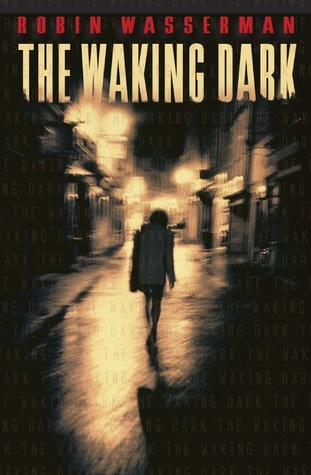 The Waking Dark
The Waking DarkRobin Wasserman
Series: N/A
Genre: Young Adult, Horror, Mystery
Rating: 4.25 out of 5 stars
Word Rating: Forward
On Goodreads
Do you like easy-going romantic YA novels with a bit of the supernatural and a dash of fantasy and ooh, just a pinch of mystery? Do you like clear cut moral lines and protags that are just plain perfect? Do you like rainbows and unicorns and sunshine and not having detailed descriptions of all of your most realistic nightmares about murder?
Then turn around. Basically, run. This book is not for you. I'm not easily scared, but I'm a big boy and am willing to admit that this novel was chilling. It's rather in your face about the violent, aggressive details (not on the level but not unlike Stephan King), but it's not particularly scary. Rather, it, in detail, describes and defines the human mind in its extremes. It involves crucifixion, infanticide, even stake burning, from various points of views.
Enter Oleander, Kansas. Silent, small town that would have never made the history books. Until the Killing Day, where Oleander finds twelve of its own dead by their friends and family, who proceeded to kill themselves. All but one, who can't even remember the horrors she committed. The town is quarantined after a torndado, and something, some disease begins to manifest in the denizens of Oleander. The characters that deliver us this story are quite important: we've a baby-killer, religious nut, a girl whose family has ties in meth, a jock with a dark secret and a survivor boy.
Everyone's as screwed up and damaged as each other, then.
It is that disease, if I can call it that, that is the most terrifying and intriguing, appalling and consuming aspect of the novel. Within the first few chapters we are given firsthand accounts of all of the murders. We are given the reigns and the eyes of these characters and asked if we can handle the mental experience. We are drawn into the story, this disease, this insanity, might be a part of us as well, a part without control or what we so blindly label humanity.
I'm not going to quote here because that defeats the spirit of the book: the narrative (including diction, syntax, etc.) are all engines fueling excess of events. This is a plot-and-character-heavy novel. You will learn and question the human condition and various philosophical bits and whether or not to kill yourself. However, you won't receive it in long monologues or epic situations. It is highly experiential and Wesserman does a world of a job in simultaneously chilling his reader, connecting his reader, and challenging his reader.
For example, when the down was ravaged by the tornado, I felt genuinely concerned and scared. How bad can it get!? Well, Wasserman is the queen of plunging her characters into even deeper pits. After the tornado, the town is in a state of horrible disarray, everyone is frightened like mad. There is no circulation of any kind of reliable information or provisions, authorities are bunk, rage and a kind of exhaustion with the situation positively correlates with even more meth, and basically everything's gone to shit.
I've never read a YA book that was so . . . deadly. The conclusion may or may not have you wringing anxiety from your sweat-drenched hair (it did for me because of course, suspense does not let up), but in all I've got to give it to Wasserman for this really monstrous piece of literature.
- Marlon
Could you forgive yourself for committing a crime you didn't consciously commit, even if that crime was murder?
Let us know in the comments!

No comments:
Post a Comment